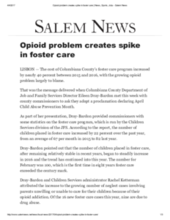This page contains documents and other resources related to children's care in the Americas. Browse resources by region, country, or category.
Displaying 2361 - 2370 of 3191
This article explores sexuality education and sexual healthcare for female adolescents in foster care with ID/DD and recommends practice guidelines to support and prepare their emergent sexual development.
BBC reports the minister of social welfare, his deputy, and the director of Virgen de Asuncion have been charged with negligent homicide.
The Advisor will provide technical guidance and support in the process of continuous institutional capacity building, program improvement, and promotion of regional strategic relationships.
Girl's death is a stark demonstration of Texas's foster care shortage.
Governor, First Lady talk about raising nine kids, and overhauling state foster care system
Parents' drug abuse often lead children down a path of abuse, neglect, and abandonment.
A camp designed to help youths who have been through the foster care system cope with grief and connect with others who have lost their birth families.
Two years into new plan to address neglect and abuse, workers still find significant care issues in DHS group homes.
Restore Opportunity Now coalition seeks living wage for human service workers.
Opioid problem has caused the cost of foster care in Columbiana County, Massachusetts to increase 40 percent.


